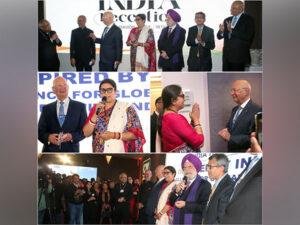
Context
- In a world striving for progress and equality, India stands tall as a beacon of commitment to gender equity and inclusion.
- With a rich tapestry of initiatives woven by both governmental bodies and the private sector, the country is forging a path towards women’s empowerment that resonates globally.
- Let’s delve into the dynamic landscape of India’s dedication to gender equality, exploring its achievements, challenges, and its pivotal role in launching the ‘Alliance for Global Good – Gender Equity and Equality’.
Gender Equity: Cornerstone of India’s Inclusive Development
- At the core of India’s developmental ethos lies the belief in equality and inclusion as indispensable pillars.
- Initiatives such as the New Delhi Leaders’ Declaration and the Women’s Reservation Bill underscore the nation’s unwavering commitment to ensuring fair treatment and opportunities for all genders.
- These efforts not only symbolize progress but also serve as catalysts for furthering the cause of gender equity.
Driving Female Participation Across Sectors
- India’s strides in increasing female participation across various sectors are commendable.
- From politics to education and entrepreneurship, the narrative is shifting towards inclusivity.
- The surge in female enrollment in STEM courses and the burgeoning number of women-led startups attest to a burgeoning ecosystem that fosters and celebrates women’s contributions.
- For instance, initiatives like the “Beti Bachao, Beti Padhao” (Save the Daughter, Educate the Daughter) campaign have significantly contributed to increasing awareness about the importance of educating girls.
A Global Catalyst for Change: The Alliance for Global Good
- The launch of the ‘Alliance for Global Good – Gender Equity and Equality’ at the World Economic Forum marks a significant milestone in India’s global leadership in advancing gender equality.
- Rooted in the ethos of inclusive development, this alliance seeks to accelerate socio-economic progress on a global scale.
- Its partnerships with esteemed stakeholders like the Confederation of Indian Industry (CII), the Ministry of Women and Child Development, and the Bill and Melinda Gates Foundation signify a shared commitment towards driving meaningful change.
Challenges on the Path to Equality
- Despite commendable progress, challenges persist.
- Addressing entrenched gender disparities, ensuring effective policy implementation, and overcoming societal and cultural barriers require concerted efforts.
- Mobilizing resources and sustaining momentum for inclusive development remain imperative, as does encouraging broader global participation and collaboration.
Charting the Way Forward
- As we navigate the complexities of gender equity, India provides a roadmap for the way forward.
- Strengthening policy implementation, investing in women’s empowerment initiatives, and fostering global collaboration are key priorities.
- Addressing societal norms through awareness campaigns and education is paramount, as is monitoring and evaluating progress to ensure accountability and sustainability.
FAQs
1. How has India’s government been promoting gender equity and equality?
Ans: India’s government has implemented various initiatives to promote gender equity and equality. One notable example is the Women’s Reservation Bill, which aims to increase women’s representation in elected bodies. Additionally, schemes such as the Beti Bachao Beti Padhao campaign focus on improving the status of girls by addressing issues like female infanticide, access to education, and gender-based discrimination. The government has also allocated significant funds to gender-specific programs through the gender budget, demonstrating its commitment to this cause.
2. What are some challenges hindering progress towards gender equity in India?
Ans: Despite efforts to promote gender equity, several challenges persist in India. These include deep-rooted societal norms and cultural practices that perpetuate gender discrimination, such as preference for sons, unequal access to education and healthcare, and limited economic opportunities for women. Additionally, gaps in policy implementation and enforcement contribute to the persistence of gender disparities. Overcoming these challenges requires sustained efforts from various stakeholders, including government, civil society, and the private sector.
3. How can individuals and organizations contribute to advancing gender equity in India?
Ans: Individuals and organizations play a crucial role in advancing gender equity in India. One way to contribute is by advocating for gender-sensitive policies and practices in workplaces and communities. This can include promoting diversity and inclusion initiatives, providing equal opportunities for women in leadership roles, and supporting women-owned businesses. Additionally, raising awareness about gender issues and challenging harmful stereotypes can help foster a more inclusive society. By working together, we can create a future where all individuals, regardless of gender, have equal opportunities to thrive.
Can you be more specific about the content of your article? After reading it, I still have some doubts. Hope you can help me.
Can you be more specific about the content of your article? After reading it, I still have some doubts. Hope you can help me.